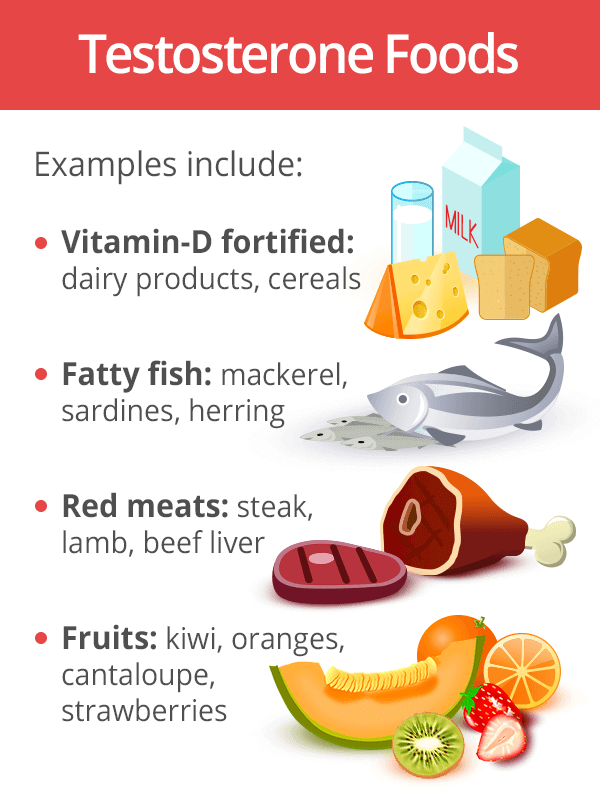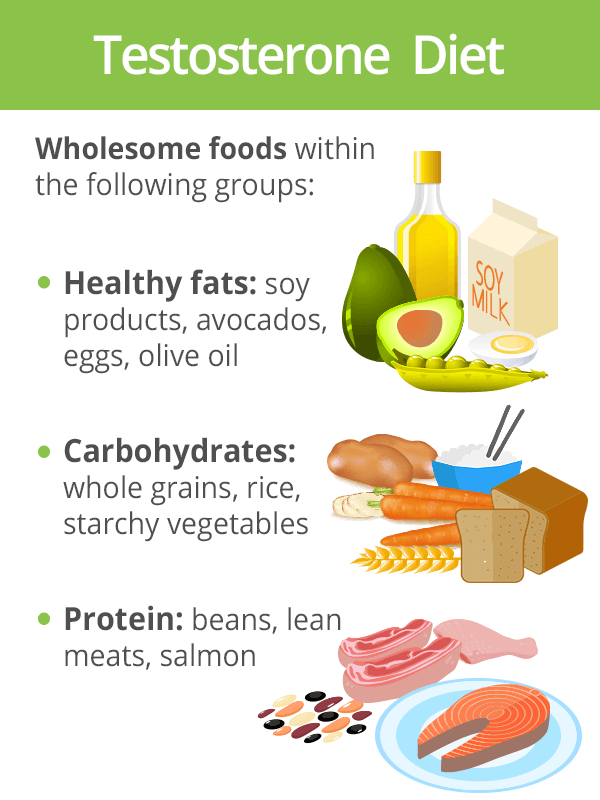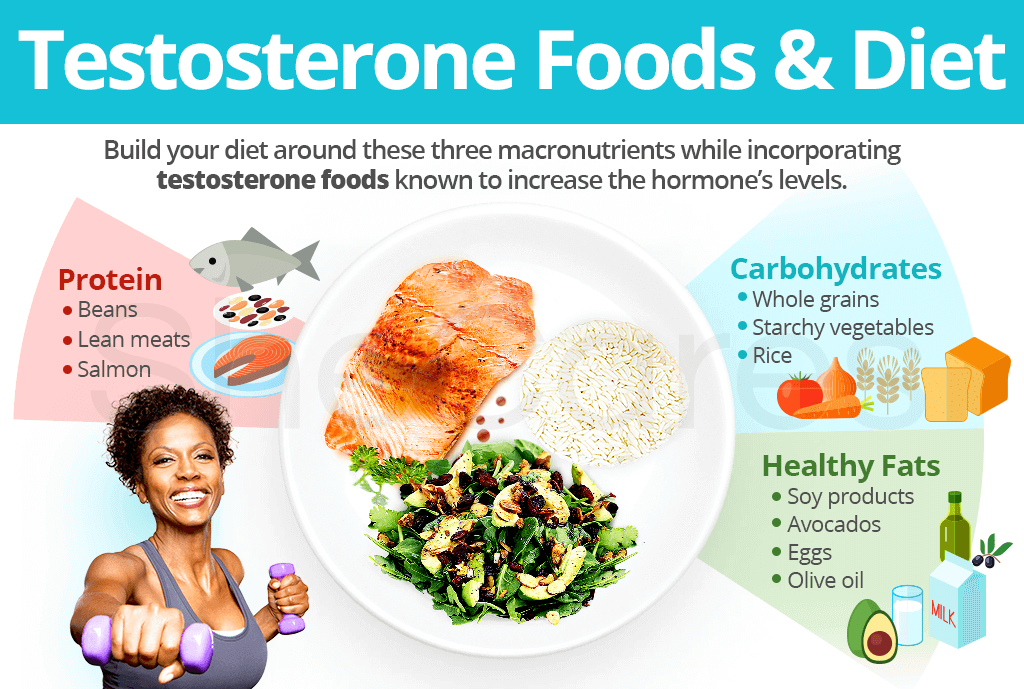One of the simplest changes women who are looking to raise their testosterone levels can do is to optimize their diet with foods that increase testosterone. However, more goes into proper meal plans than just picking and choosing from the list of food options below.
Continue reading to learn more about testosterone foods and diet, and take a first step toward ultimate hormonal balance and alleviation of tiring, stressful symptoms.
Testosterone Foods

Unlike estrogen, there are no foods that contain plant-based equivalents of the hormone testosterone.
Those claimed to be testosterone foods have been scientifically researched to increase levels of the reproductive hormone in women's bodies. Or, they contain necessary nutrients needed to support the hormone's healthy levels, such as vitamin D, magnesium, and vitamin C.
Foods that increase testosterone - either directly or indirectly - include, but are not limited to:
- Full-fat dairy (cheese, butter)
- Egg yolks
- Vitamin D-fortified foods (dairy products, soy milk, cereals, etc.)
- Fatty fish (mackerel, sardines, herring)
- Coconut
- Red meats (steak, lamb, beef liver)
- Nuts (pumpkin seeds, almonds, cashews, peanuts)
- Spinach
- Dark chocolate
- Fruits (kiwi, oranges, cantaloupe, strawberries)
- Vegetables (broccoli, cauliflower, kale, red bell peppers, tomatoes)
Testosterone Diet

When it comes to increasing testosterone through food, structure the aforementioned testosterone-promoting foods into a diet centered on the following groups:
Healthy fats
Cholesterol is a type of fat-like molecule found in food in addition to our blood. It possesses important functions in women's body, including acting as a precursor to androgen hormones.
Eating foods high in saturated fats causes your body to produce higher levels of LDL cholesterol (low-density lipoprotein, a.k.a. “bad” cholesterol) in your body, increasing heart disease risk. On the other hand, unsaturated fats help raise the “good” cholesterol in your body, which are high-density lipoproteins (HDL).
While it is not necessary to avoid saturated fats at all cost, it is important to consume a healthy balance of saturated and unsaturated fats for stable and healthy cholesterol levels.
Food choices for healthy fats consist of grass-fed, pastured animals; soy products; fatty fish, like tuna or salmon; avocadoes; whole eggs; extra virgin olive oil; and more.
Carbohydrates
Low carbohydrate diets reduce free testosterone levels in women and increase sex hormone binding globulin (SHBG), which binds to testosterone to eliminate it from the body. Therefore, women who are trying to naturally increase testosterone levels with food should not shy away from consuming carbohydrates in healthy amounts.
Keep in mind the crucial difference between simple and complex carbohydrates. Complex carbohydrates take longer for the body to digest, thus helping to keep blood sugar levels steady after eating.
Complex carbs are found in whole grains, rice, beans, peas, and starchy vegetables.
Protein
Lastly, consuming sufficient amounts of protein has been scientifically proven to optimize testosterone levels, especially when combined with exercising. Increasing muscle mass is achieved more effectively when one consumes protein and carbohydrates within an hour of strength training.
Possible choices include grass-fed, lean meats; wild-caught salmon; dairy products; and various beans, among others.
Key Takeaways
In summary, there are a plethora of testosterone foods that can help women naturally raise the hormone's levels, many due to nutrients such as vitamins D and C as well as magnesium that foster healthy testosterone levels. Though, instead of just dabbling here and there, structure them around a testosterone diet rich in a combination of healthy fats, carbohydrates, and protein.
Nevertheless, for optimal results, complement a testosterone diet with natural testosterone supplements and boosters, which are proven to amend the imbalance once and for all.
Sources
- American Cancer Society. (2018). Choosing Healthy Fats. Retrieved December 3, 2018, from https://www.cancer.org/latest-news/choosing-healthy-fats.html
- American Heart Association. (2017). The Skinny on Fats. Retrieved December 3, 2018, from https://www.heart.org/en/health-topics/cholesterol/prevention-and-treatment-of-high-cholesterol-hyperlipidemia/the-skinny-on-fats
- Cinar, V. et al. (2011). Effects of magnesium supplementation on testosterone levels of athletes and sedentary subjects at rest and after exhaustion. Biological Trace Element Research, 140(1), 18-23. doi: 10.1007/s12011-010-8676-3
- Cleveland Clinic. (n.d.). Magnesium Rich Food. Retrieved December 3, 2018, from https://my.clevelandclinic.org/health/articles/15650-magnesium-rich-food
- Grimaldi, A.S. et al. (2013). 25(OH) Vitamin D is Associated with Greater Muscle Strength in Healthy Men and Women. Medicine & Science in Sports & Exercise, 45(1), 157-162. Doi: 10.1249/MSS.0b013e31826c9a78
- Hirokawa, K. et al. (2016). Moderating effects of salivary testosterone levels on associations between job demand and psychological stress response in Japanese medical workers. Industrial Health, 54(3), 194-203. doi: 10.2486/indhealth.2015-0113
- Lado-Abeal, J. et al. (1999). Differences between men and women as regards the effects of protein-energy malnutrition on the hypothalamic-pituitary-gonadal axis. Nutrition, 15(5), 351-358. Retrieved November 21, 2018, from https://www.ncbi.nlm.nih.gov/pubmed/10355847
- McGrice, M. & Porter, J. (2017). The Effect of Low Carbohydrate Diets on Fertility Hormones and Outcomes in Overweight and Obese Women: A Systematic Review. Nutrients, 9(3), 204. doi: 10.3390/nu9030204
- MedlinePlus. (2018). Complex carbohydrates. Retrieved December 3, 2018, from https://medlineplus.gov/ency/imagepages/19529.htm
- Peters, E.M. et al. (2001). Vitamin C supplementation attenuates the increases in circulating cortisol, adrenaline and anti-inflammatory polypeptides following ultramarathon running. International Journal of Sports Medicine, 22(7), 537-543. doi: 10.1055/s-2001-17610
